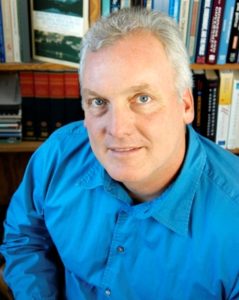This week’s interview is with Dr. Steven Hackett, the Interim Associate Dean of Professional Studies and Chair of the School of Business at Humboldt State University. Dr. Hackett has served as principal investigator, project director, lead author or senior supervising economist on numerous scholarly works, technical reports, policy studies, and regional economic development plans. Continue reading to find out about his current leadership in incorporating sustainability across the core curriculum of HSU’s School of Business.
 Your research from early on has been focused on social and environmental economic concerns. How did you become interested in these dimensions?
Your research from early on has been focused on social and environmental economic concerns. How did you become interested in these dimensions?
I was brought up with a strong environmental and social ethic, and I began my undergraduate studies in a natural resources management field. While my graduate studies were fully centered in economics, I have been very fortunate to be able to combine economics with my long-time interest in the environment, natural resources, clean energy, and sustainability.
What are the primary driving factors behind the decision to incorporate sustainability across the curriculum in HSU’s School of Business?
I frame this as a process of aligning the Business School with the university and the region. Humboldt State has recently completed WASC accreditation, and coming out of that process the university has articulated a clear set of core values linked to sustainability. Sustainability is thus a key part of HSU’s identity. Our North Coast region of California is likewise widely known for its sustainability ethic, which among other things is reflected in a wide range of local “green” products and services.
What are the metrics or categories used to assess whether a course is sufficiently focused around sustainability?
Our infusion is academically rigorous and is drawn from the scholarly literature as well as the input of experts in the field. Our model is a middle path – I want to make sure that core traditional business concepts continue to be addressed so that the students get robust business training. Within that context, I have created a small grant program to support faculty infusing their courses with sustainability in a meaningful way.
I have asked faculty to approach this from a “win-win” point of view. There are many examples — energy and resource efficiency, appealing to “green” consumer segments / using clean, green, and sustainable as product differentiation factors, and understanding new markets created by third-party certification and regulation. I want our graduates to understand both conventional and sustainable business, and to be capable of critically assessing business opportunities linked to clean, green, and socially responsible products and services. Given my background in this area, I am working one on one with each faculty member. I am also consulting with Rick Bunch from the Erb Institute at the University of Michigan, who created Beyond Grey Pinstripes. The process is adaptive and flexible– we will learn and improve as we go.
How is the decision-making structure organized, and what is the general process for proposing and instituting a change to the curriculum?
The process is adaptive, flexible, and collaborative. I provided a broad context and I also offer specific suggestions. Faculty develop tentative approaches that they go over with me. We are also setting up a process in the department where faculty can share approaches and best practices with each other.
What is the timeline for fully integrating sustainability across HSU School of Business’s core curriculum?
Our voluntary program will transform most of our courses by the end of the 2011-12 academic year. It is an adaptive and collaborative process, however, and so there will be ongoing changes and revisions as we gain more experience and learn by doing.
How do you envision the transformation of the School of Business affecting the University writ large as well as other higher education institutions?
As I noted above, HSU’s core values are clearly focused on sustainability, and the campus is known for its strong environmental, natural resource, and clean energy programs. The social-sciences and humanities are also at least a decade into addressing sustainability. What has been somewhat underdeveloped is the business approach to sustainability. While the School of Business benefits from its alignment with campus, the rest of the campus community also benefits – after all, business and the economy make up one of the three pillars of a sustainable society. Infusing sustainability also links our Business school with other such programs around the country and the world.
What has been – or do you think will be – the response from businesses to this shift toward making sustainability a normative standard in business education?
The key here is to take a “win-win” approach that is non-ideological, and to train out students to understand and critically assess green and sustainable business opportunities, as well as the societal imperatives that underlie them. Business is an important part of the broader community, and business can lead the way if we provide effective training to our students – who are tomorrow’s business leaders.
What aspect of this core curriculum restructuring at the School of Business has interested you the most?
I most enjoy creating a context in which faculty are given the opportunity to do what they do best – be creative and to design meaningful learning opportunities for their students. The Business School faculty have demonstrated substantial commitment and enthusiasm to this programmatic direction, and I am happy with the very small part I have played in helping to make that happen.